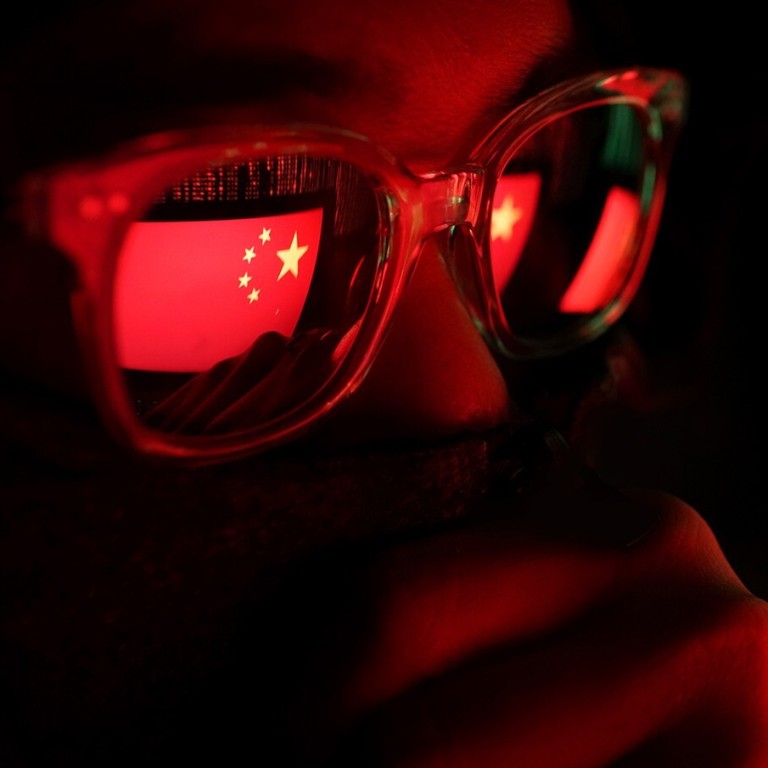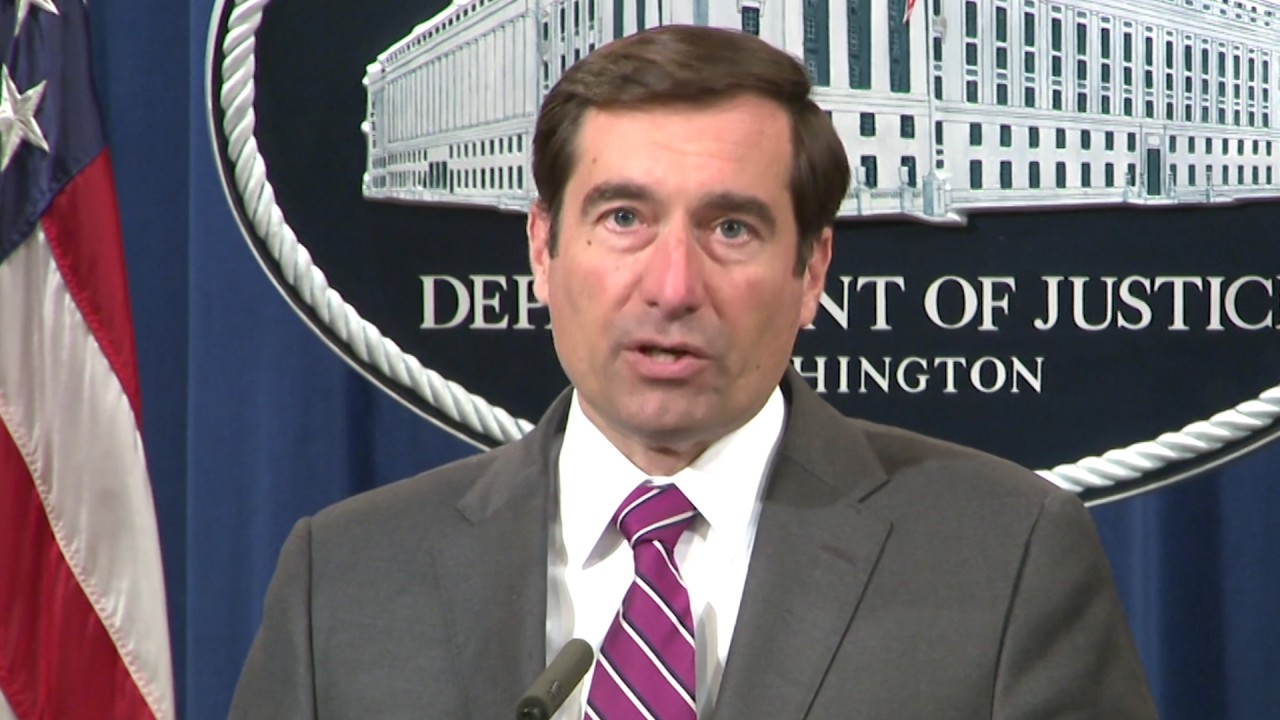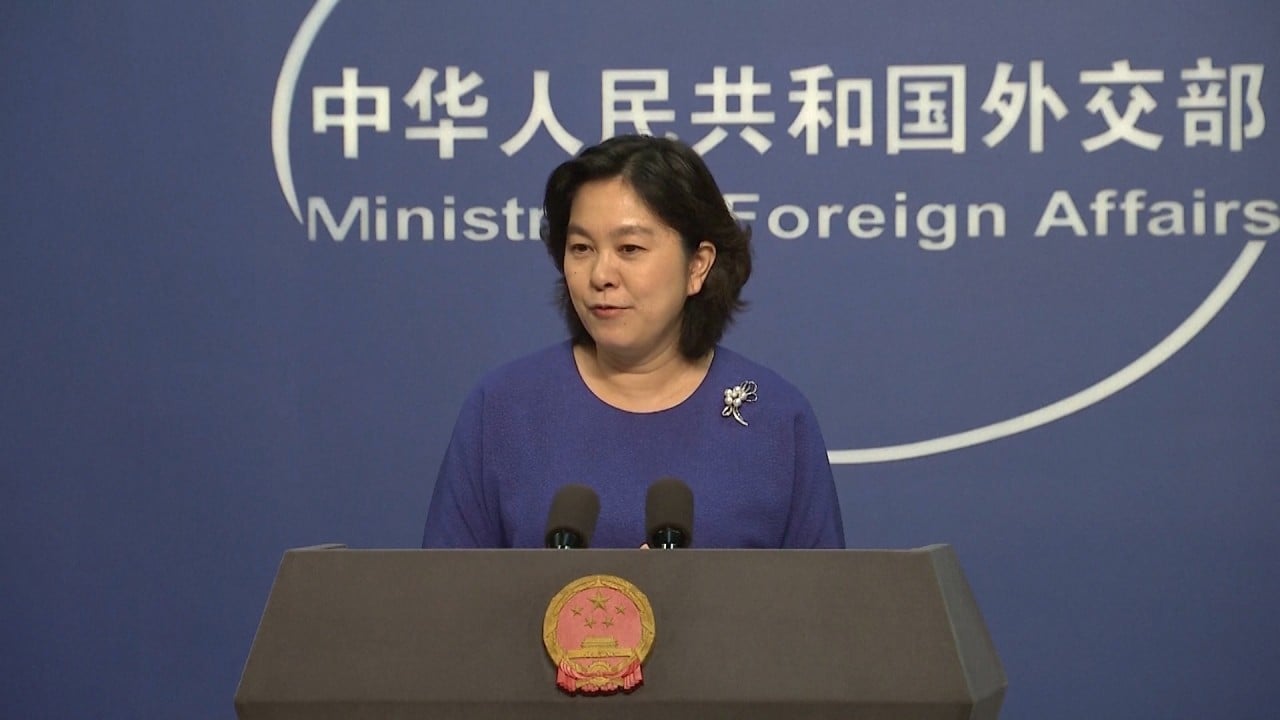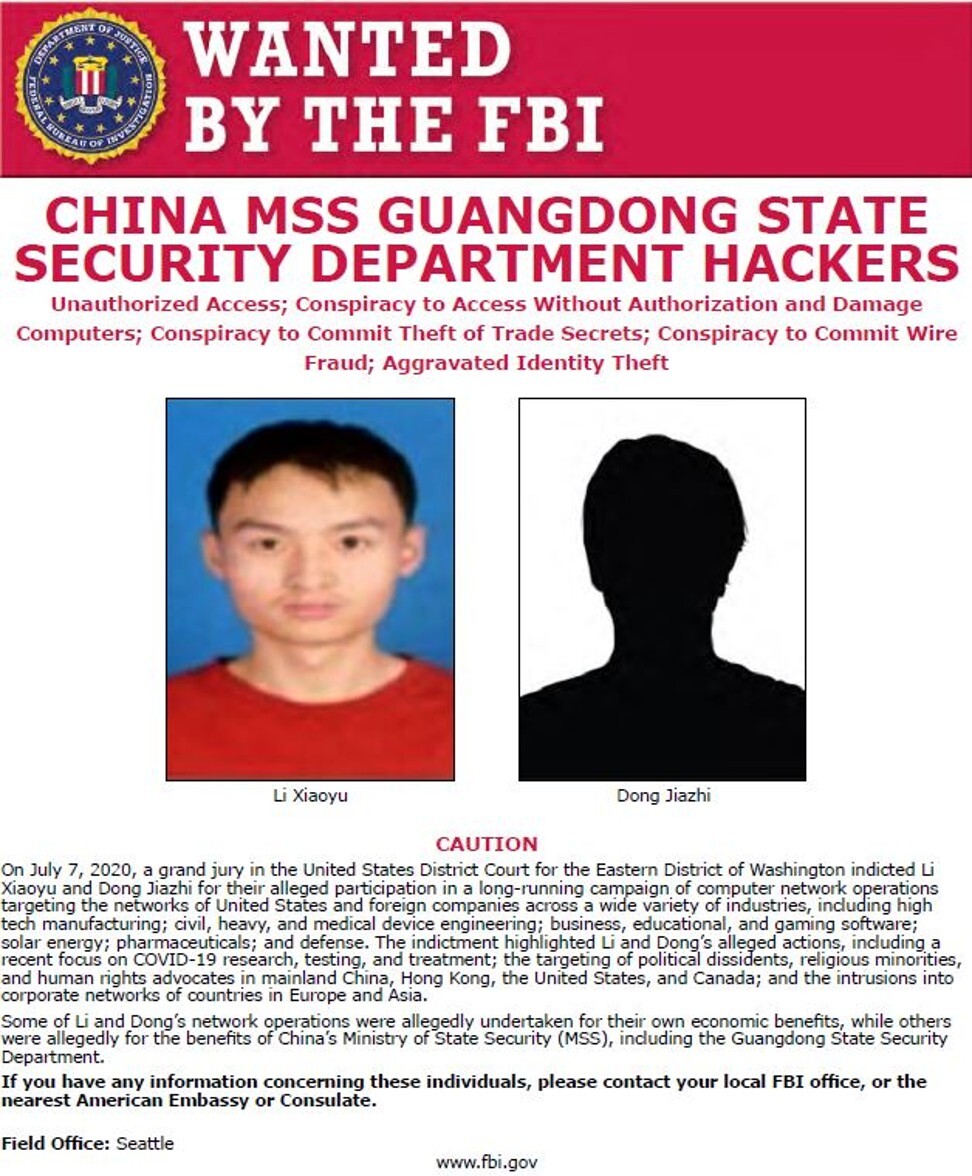
US indicts Chinese hackers on charges of targeting coronavirus vaccine data and defence secrets
- Li Xiaoyu and Dong Jiazhi were charged with 11 counts of conspiracy, identity theft and fraud
- Li and Dong’s alleged victims include the US Department of Energy and more than a dozen US defence contractors, pharmaceutical companies and software firms
The US government has indicted two Chinese nationals in connection with long-running cyber espionage operations that aimed to net information on Covid-19 vaccines, military weapons and human rights activists, in what is the second Justice Department indictment against individuals from China in recent days.
Li Xiaoyu, 34, and Dong Jiazhi, 33, were charged with 11 counts of conspiracy, identity theft and fraud related to operations carried out from China since 2009, some in conjunction with China’s Ministry of State Security (MSS), according to an indictment filed on July 7 with the US District Court for the Eastern District of Washington and unsealed on Tuesday.

01:29
US indicts Chinese men for hacking related to coronavirus vaccine data and defence secrets
Li and Dong’s victims include the US Department of Energy and more than a dozen US defence contractors, pharmaceutical companies and software firms, according to the document, which did not identify any of the companies. Non-US companies named as the defendants’ victims include a South Korean shipbuilding and engineering firm, an Australian defence contractor and two German software ventures.
Responsible for intelligence gathering and conducting investigations on issues related to interaction between Chinese and foreign entities, the MSS is roughly equivalent to America’s National Security Agency (NSA) and Central Intelligence Agency (CIA).
“China has now taken its place, alongside Russia, Iran and North Korea in that shameful club of nations that provide a safe haven for cyber criminals in exchange for those criminals being ‘on call’ to work for the benefit of the state, here to feed the Chinese Communist Party’s insatiable hunger for American and other non-Chinese companies’ hard-earned intellectual property, including Covid-19 research,” John Demers, the assistant attorney general for national security, said in a Justice Department announcement.
The most recent hacking activity by Li and Dong involved finding “vulnerabilities in the networks of biotech and other firms publicly known for work on Covid-19 vaccines, treatments, and testing technology”, the indictment said.
On the military front, they are charged with stealing data on satellite programmes, wireless networks and communications systems, high powered microwave and laser systems, a counter-chemical weapons system and ship-to-helicopter integration systems.
The alleged hacking activity also targeted dissidents of interest to Beijing.
“They provided the MSS with email accounts and passwords belonging to a Hong Kong community organiser, the pastor of a Christian church in Xi’an and a dissident and former Tiananmen Square protester,” the court document said.
Chinese hackers targeting US coronavirus research, FBI warns
Asked for comment, the Chinese embassy in Washington sent a response by foreign ministry spokeswoman Hua Chunying on July 17 to accusations by US Attorney General William Barr a day earlier that “PRC-linked hackers have targeted American universities and firms in a bid to steal IP related to coronavirus treatments and vaccines”.
“Some US politicians seem to be alleging that China is waging cyberattacks to steal US research on Covid-19 vaccines,” Hua told reporters in Beijing.
“It’s just absurd,” she said. “We are already leading the world in vaccine R&D with top researchers. We don't need to secure an edge by theft. As we speak, Chinese research teams are moving ahead with multiple vaccine tasks through five technical routes.”
Hua also pointed to a recent report by Yahoo News, citing former US officials, which claimed that the CIA conducted offensive cyber operations against China, Iran, Russia and other targets after US President Donald Trump issued a secret order in 2018 that authorised such actions.
Scientist’s world upended after he’s swept up in US national security net
“This is information warfare so there's a lot of evasion and distraction going on here,” said Corrinne Zoli, director of research at the Institute for Security Policy & Law at Syracuse University in New York. “I think the issue is not that the Chinese need more clinical data to sort out their own vaccine programmes.”
China is more likely to be “trying to probe the US response to what really is an economic and security threat that is the pandemic”, she added. “They’re trying to figure out if the response is leading to the US to be more stable or unstable, if their response is indicative of a government that resilient or a government that’s in crisis.”
Song Chen was charged “in connection with a scheme to lie about her status as an active member of the People’s Republic of China’s military forces” while conducting medical research at Stanford, US Attorney David Anderson and FBI special agent John Bennett said on Monday.

03:01
Banning 92 million Communist Party members from America ‘ridiculous’, Beijing says
According to the July 17 indictment, Song said on her US visa application, submitted in 2018, that her military service ended in 2011, which conflicted with FBI evidence pointing to her status as an active duty member of civilian cadres of the People’s Liberation Army.
While the US Justice Department and the FBI have been tracking espionage cases tied to China for years, they have been more public about the effort since 2018, when then attorney general Jeff Sessions announced a “China Initiative” aimed at countering such activity.
“In addition to identifying and prosecuting those engaged in trade secret theft, hacking and economic espionage, the initiative will increase efforts to protect our critical infrastructure against external threats including foreign direct investment, supply chain threats and the foreign agents seeking to influence the American public and policymakers without proper registration,” according to a fact sheet on the effort.
How Belgium became a den of spies and gateway for China
“What you’re seeing now is just an administration that’s got a more of a forward posture … you're seeing more inter-governmental operability, you’re seeing more inter-agency cooperation to manage this threat,” said Zoli. “Any nation state that has capacity, and usually that's any nation state with a developed military, is going to have some information warfare capacity,” including the US.
The difference, she added, is that while the US government limits cyber espionage to the countering of national security threats, China is more inclined to hack for economic and commercial secrets as well.
“That’s where I think they are in a league of their own,” she said.


